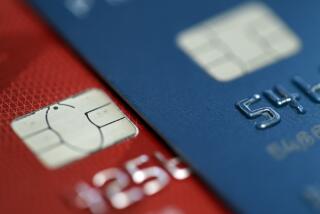CONSUMER CREDIT : Rise in Fraud Prompts Call for New Credit Card ID : Security: With losses of more than $1 billion in ‘91, banks seek mandatory use of personal identification numbers like those used on automated teller machines.
- Share via
NEW YORK — Concerned about increases in fraud, the major bank card associations are considering the mandatory use of personal identification numbers for credit card purchases.
The idea, long considered impractical with credit cards, was broached in a speech last week by Alex Hart, president of Mastercard International Inc.
“I think we are at great risk every passing month that we don’t move forward to implement PINs,” Hart told members of the International Assn. of Credit Card Investigators.
He acknowledged that it would take years to make PINs--used for automated teller machine withdrawals and many debit card transactions--standard with credit cards. But he said it was “crucial” to explore such a requirement to improve security at retailing sites.
Christoph Abt, a Visa International spokesman, said his association agreed that “moving to PINs is inevitable in the long term.”
Bank members of Mastercard and Visa lost more than $1 billion last year to credit card fraud. At Mastercard, losses from stolen or fake cards have almost doubled to 17 basis points of total sales in 1991, from about 9 basis points in 1989, said Philip Verdi, an executive vice president of the card group.
A basis point is 1/100th of a percentage point.
Visa members worldwide lost $630 million to fraud in 1991, $97 million of which was because of counterfeiting, Abt said.
But requiring personalized code numbers will not be an easy sell. They unarguably help identify the person conducting a card transaction as the owner of the card, but they are also expensive for merchants and issuers.
And they may be confusing to customers, many of whom own multiple credit cards, debit cards and phone-calling cards.
For those reasons, the idea of requiring PINs on credit cards up to now has never proceeded beyond the discussion stage.
The credit card associations, in fact, have spent lavishly to develop authorization systems aimed at simplifying the use of cards by consumers, merchants and processors.
Another big obstacle to PINs has been hardware. Specialized point-of-sale terminals, called PIN pads, would be required at every merchant and service establishment that accepted a bank credit card.
The pads, mini-keyboards that scramble the numbers before sending them out for authorization, cost about $150 each.
One of the principal reasons Hart and others are now raising the possibility of the numbers is that PIN pads are also required for most merchants who accept debit cards. Both Visa and Mastercard are actively pushing new debit card networks.
“Given that debit cards are moving into a PIN environment, there is a real incentive to explore its value in conjunction with credit cards,” Hart said in a telephone interview after the conference.
Many bankers agree.
“We can now think about PINs more and more because there are terminals at the point of sale that make it feasible,” said Paul Steger, a first vice president at Comerica Inc. in Detroit.
But he went on to describe PIN requirements for credit cards as “a good idea for the future. Like anything that requires a technological change, it’s going to take time,” he said.
Steger said he believes that the most difficult part of the PIN requirement is on the consumer side.
More to Read
Inside the business of entertainment
The Wide Shot brings you news, analysis and insights on everything from streaming wars to production — and what it all means for the future.
You may occasionally receive promotional content from the Los Angeles Times.










